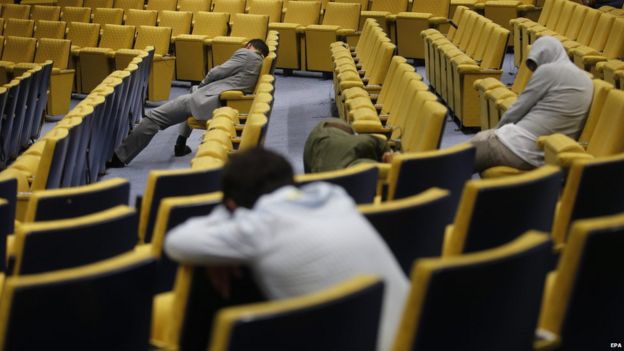Eurozone leaders have talked through the night in Brussels in a bid to agree terms for a new bailout for Greece.
Reports say a draft compromise has been put to the emergency summit but no details have emerged so far.
Without a new bailout, Greece’s banks face collapse and the country could exit the euro.
Greece is being told to pass legislation on a series of reforms by Wednesday before any talks on another bailout can begin.
But the BBC’s Chris Morris in Brussels says there is still no agreement on exactly what Greece has to do.
Follow the latest updates here
Earlier, eurozone finance ministers submitted a list of measures to the leaders following two days of fraught discussions.
But one Greek government official called the proposals “very bad”. Another said some of the proposals appeared designed to “humiliate” Greek Prime Minister Alexis Tsipras and his left-wing Syriza government.
The summit was paused for several hours overnight to allow talks between Mr Tsipras, German Chancellor Angela Merkel, French President Francois Hollande and European Council President Donald Tusk.
Early on Monday, Mr Tusk’s spokesman announced the summit was reconvening to discuss a “compromise proposal”.
The four-page document of draft proposals put forward by eurozone finance ministers include:
- Reforms set out by Greece to be ratified by parliament by Wednesday, 15 July
- “Ambitious” reforms to pensions and labour markets
- International creditors to work on the ground in Athens and have full oversight of draft legislation
- Possible transfer of €50bn in “valuable” Greek assets to external fund for eventual privatisation
- Possible talks on “swift negotiations on a time-out from the euro area, with possible debt restructuring” if a bailout is not agreed
However, one senior EU official said there was no chance of “time-out” proposal surviving in any final document to be approved by eurozone leaders. Another official said there was no provision and therefore no legal basis for such an arrangement in the EU treaties.
Reports also emerged that Greece was holding out over the proposed role of the IMF in the new programme and over the independent fund to hold Greek assets.

The all-night summit took its toll on waiting journalists
Tough choices for Greece – by Paul Kirby, BBC News website Europe editor
There may only be four pages, but if this draft document is agreed, it would be an extremely difficult pill for Greeks to swallow.
For Alexis Tsipras and his left-wing Syriza-led administration, some of the ideas would be little short of humiliation.
Even if Greek MPs pass sweeping reforms by Wednesday, the government would have to allow international creditors full monitoring of its work in Athens and agreement of draft laws in advance.
Syriza came to power promising an end to such oversight.
Another possible step is to “amend or compensate” for any laws Syriza pushed through that ran counter to what was agreed with the eurozone in February.
That might mean overturning the reinstatement of 4,000 civil servants such as school guards and cleaning ladies.
Are Greeks heading for Grexit?
Could euro survive temporary exit of Greece?
Why did Greece hold a referendum?
Arriving for Sunday’s meeting, Mr Hollande dismissed any suggestion of a “time-out” for Greece.
“There is no temporary Grexit, there is a Grexit or there is not a Grexit,” he said, adding that he would “do everything to find a deal tonight”.
Mr Tsipras was also upbeat, telling reporters: “I’m here ready for an honest compromise… we can reach an agreement tonight if all parties want it.”
BBC
 Q FM Africa's Modern Radio
Q FM Africa's Modern Radio